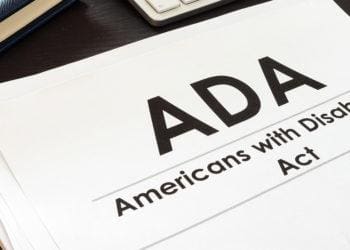This piece was originally shared as a news tip on the Nilan Johnson Lewis website and is republished here with permission.
Revisions to the Minnesota Human Rights Act (“MHRA”) enacted at the end of the just-completed legislative session are intended to provide businesses with additional protection against the recent trend of “drive-by” disability discrimination lawsuits – threats of litigation designed to pressure businesses, often small businesses, to agree to make early cash payoffs rather than face the cost of protracted lawsuits. Effective May 24, 2016, the new bill establishes additional requirements and defenses for disability discrimination claims relating to architectural barriers. Specifically, the new bill requires a plaintiff who is represented by an attorney to send a business a demand letter before filing a lawsuit, which must list each architectural barrier the plaintiff claims violates the law. In addition, plaintiffs may not demand or request a cash payment in exchange for not filing suit and must give the business a reasonable time (at least 30 days) to respond. The bill also offers an incentive for businesses to proactively complete “accessibility audits,” which can later be used in court as a defense.
While the effort to protect small businesses is well-intentioned, lawyers say there may be some soft-spots in Minnesota’s attempt to continue to ensure accessibility of public facilities while at the same time lessening the risk of bankrupting small businesses due to oversights, often minor or technical ones, by general contractors. “Although this is a step in the right direction, the bill was drafted vaguely with missing details that may cause the courts to spend a lot of time sorting out the ambiguity,” said Matthias Niska, a labor and employment attorney for Nilan Johnson Lewis, who specializes in disability-related issues. “For example, the bill doesn’t specify if it applies only to traditional, brick-and-mortar architectural barriers, or if it applies to digital barriers on the websites of these businesses, as well. Moreover, the law states that the plaintiff can bypass notice requirements and collect damages in the event of an injury, but doesn’t define what constitutes a legitimate injury (e.g., emotional damage as well as physical). And it doesn’t indicate whether sending a demand letter is a jurisdictional requirement, or instead can be waived if a business fails to raise it as a defense,” said Niska.
Importantly, the law only applies to claims under Minnesota state law. Claims under Title III of the federal Americans with Disabilities Act, which also addresses the same kinds of architectural barriers, are unaffected. “At some point, the federal government is going to do something, and they will see Minnesota as a model to embrace or a model to avoid,” adds Zachary Crain, an attorney at Nilan Johnson Lewis, whose practice includes advising companies and nonprofits on complying with the ADA and other regulatory matters. “In the meantime, businesses should be mindful and proactive in accommodating the needs of individuals with impairments, as most of those needs can be addressed simply,” said Crain.









